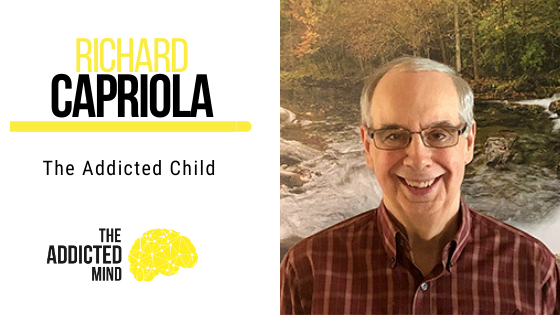A lot of times, parents out there have kids struggling with addiction and they don’t know what to do or how to notice it. Unfortunately, adolescent addiction is oftentimes written off by a lot of parents because they think what they see as some crazy teenage behavior is just a normal developmental issue – but that may not be the case.
Let’s add the fact that kids hardly tell their parents about their substance abuse for fear of being judged. And this becomes a huge motivator for them to shut down. How do we bridge this gap then?
On today’s episode of The Addicted Mind Podcast, Duane talks with Richard Capriola, substance abuse counselor and author of the book The Addicted Child: A Parent’s Guide to Adolescent Substance Abuse.
Whether you’re a parent with an adolescent kid struggling with substance or alcohol abuse, or you know someone whose kid is struggling from substance or alcohol abuse, or you suspect your kid is struggling with this issue because you’re noticing some changes in their appearance, behavior, attitude – adolescent addiction isn’t something you should be taking lightly.
While addiction affects the child, it also affects the entire family system. And this is why the family has to be there throughout this whole process as well. They all should work together as a team to ensure a better outcome.
In this episode, you will hear:
- The Addicted Child as a roadmap for parents and children struggling with substance abuse
- Two differences between adult addiction and adolescent addiction
- Treatment for substance abuse among adolescents
- How the family is involved in the treatment
- Common reactions from parents
- The importance of looking at the warning signs
- How to lessen the possibility of addiction in your children
Key Quotes:
[02:58] – “A lot of parents were surprised at the extent of their child’s use of substances.”
[05:43] – “For a 14, 15, 16-year-old adolescent, their brain is still in the process of developing so putting alcohol or drugs into a developing brain runs at much higher risk of more serious consequences.”
[08:19] – “The motivation factor many times is to identify and then address the underlying issue that is really driving the child to use the alcohol or the marijuana.”
[09:04] – “Once you can move the discussion away from focusing on alcohol and drug abuse, then you’ve opened the door for them talking about what’s really troubling them.”
[11:58] – “The addiction affects the child, but it also has effects on the entire family system as well.”
[16:06] – “A lot of parents misinterpret the signals they’re seeing… they tend to write it off as just being some type of developmental issue.”
[26:50] – “Look beyond just the alcohol and drug use. There might be an underlying issue that needs to be treated as well.”
[28:05] – “A large part of treatment involves not only addressing the alcohol and the drug use but teaching kids these coping skills.”
Subscribe and Review
Have you subscribed to our podcast? We’d love for you to subscribe if you haven’t yet.
We’d love it even more if you could drop a review or 5-star rating over on Apple Podcasts. Simply select “Ratings and Reviews” and “Write a Review” then a quick line with your favorite part of the episode. It only takes a second and it helps spread the word about the podcast.
If you really enjoyed this episode, we’ve created a PDF that has all of the key information for you from the episode. Just fill in your information below to download it.
Supporting Resources:
The Addicted Child: A Parent’s Guide to Adolescent Substance Abuse

